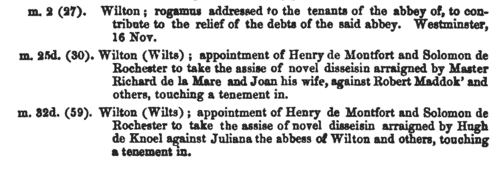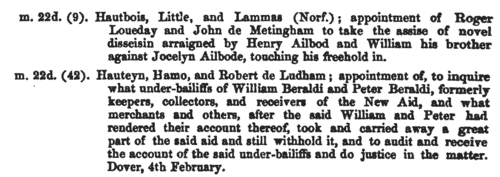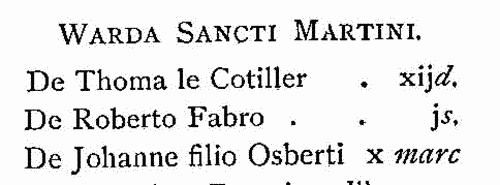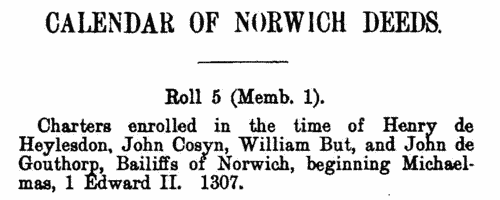Add this eBook to your basket to receive access to all 500 records. Our indexes include entries for the spelling lynn. In the period you have requested, we have the following 500 records (displaying 1 to 10): These sample scans are from the original record. You will get scans of the full pages or articles where the surname you searched for has been found. Your web browser may prevent the sample windows from opening; in this case please change your browser settings to allow pop-up windows from this site. Patent Rolls: entries for Lincolnshire
(1275-1276)
Calendars of the patent rolls of the reign of king Edward I are printed in the Calendars of State Papers: but these cover only a fraction of the material on the rolls. From 1881 to 1889 the reports of the Deputy Keeper of the Public Record Office also include calendars of other material from the rolls - about five times as many entries as in the State Papers - predominantly mandates to the royal justices to hold sessions of oyer and terminer to resolve cases arising locally; but also other general business. The calendar for the 4th year of king Edward I [20 November 1275 to 19 November 1276], hitherto unindexed, is covered here. | Sample scan, click to enlarge

| Patent Rolls: entries for Cumberland
(1277-1278)
Calendars of the patent rolls of the reign of king Edward I are printed in the Calendars of State Papers: but these cover only a fraction of the material on the rolls. From 1881 to 1889 the reports of the Deputy Keeper of the Public Record Office also include calendars of other material from the rolls - about five times as many entries as in the State Papers - predominantly mandates to the royal justices to hold sessions of oyer and terminer to resolve cases arising locally; but also other general business. The calendar for the 6th year of king Edward I [20 November 1277 to 19 November 1278], hitherto unindexed, is covered here. | Sample scan, click to enlarge

| Worcestershire Inhabitants
(1280)
The Worcestershire Lay Subsidy roll of about 1280 lists lay inhabitants of each township of the shire and of each ward of the city of Worcester, with the amount of tax payable by each. Latin. | Sample scan, click to enlarge

| Inhabitants of Leicester
(1103-1327)
The Corporation of Leicester commissioned the publication (in 1899) of extracts from the earliest borough archives, edited by Mary Bateson. This volume brings together several important sources: the borough charters; the merchant gild rolls (from 1196 onwards); tax returns; court rolls (from about 1260 onwards); mayoral accounts, &c. All the Latin and French texts are accompanied by English translations. Membership of the merchant gild was by right of inheritance (s. p. = sede patris, in his father's seat), or by payment of a fee called a 'bull' (taurus). The sample scan shows part of a gild entrance roll; those marked * paid their bull, and were thus, by implication, not natives, or at least not belonging to gild merchant families. By 1400 membership of the gild merchant had become the equivalent of gaining freedom of the borough (being a free burgess): but at this period the two were not necessarily the same, and some of the merchant gild members were not resident in the borough, merely traded there. Not all the tax rolls surviving for this period are printed: but full lists of names are given for a loan for redemption of pontage and gavelpence of 1252-3 (pp. 44-46); five tallages of 1269 to 1271 brought together in a single table (128-145); and tallages of 1286 (208-211), 1307 (255-257), 1311 (272-274) and 1318 (310-313). The portmanmoot (or portmote) was the borough court dealing with minor infractions and civil suits. Finally, there is a calendar of charters (from c.1232 onwards, 381-400), and a list of mayors, bailiffs (reeves), receivers and serjeants (401-407).
| Sample scan, click to enlarge

| Staffordshire entries on the Assize, De Banco and Fine Rolls
(1307-1327)
Extracts of Staffordshire entries from these three series of records for the reign of king Edward II were made by Major-General the Hon. G. Wrottesley, and published by the William Salt Society in 1888. The justices in eyre (itinerant) holding assizes not only tried all civil actions outstanding on their advent, pleas of the crown and common pleas, but also interrogated the juries of each hundred and borough as to the Articles of the Eyre, inquiring into the king's proprietary rights, escheats, wardships, and questions of maladministration. The court of King's Bench (de Banco) sat in Westminster, similarly dealing with court cases brought in from throughout the country. The fine rolls record part of the government administration in England, with orders sent out day by day to individual officers, and commitment of particular responsibilities and duties. Wrottesley's extracts are far from exhaustive, as he confined his attention to those landed gentry families that he considered of importance.
| Sample scan, click to enlarge

| Inhabitants of Norwich
(1307-1341)
This calendar of the deeds enrolled from 1307 to 1341 was compiled for the corporation by Edith Crosse (MacKinnon), indexed by Walter Rye, and published by the Norfolk and Norwich Archaeological Society in 1915. They are set out chronologically, translated from the original Latin into English, giving the name and occupation of grantor and grantee, and naming the parish in which the property lay. Precise dates are not given, just the regnal year. | Sample scan, click to enlarge

| Inhabitants of Cambridge
(1298-1389)
'Cambridge Gild Records' was edited by Mary Bateson for the Cambridge Antiquarian Society, and printed in 1903. Several important records for the town are brought together: minutes of the Gild of St Mary in the church of St Mary in the Market Place, 1298-1319 (pages 1-13); bede rolls of the same of around 1349 (14-25); minutes of the Gild of Corpus Christi in the church of St Bene't (26-62); returns for all the Cambridge gilds in 1389 (63-128); a calendar of deeds connected with the gilds of St Mary and Corpus Christi (129-150); and also a subsidy roll for the borough, listing householders in the 8th year of king Edward II (1314-1315) (151-157). The gild minutes include lists of persons entering the gild, usually paying a certain amount for alms and for wax for lights (candles). The bede rolls list prayers for the souls of the deceased, using the formula 'pro anima ..... (et ..... uxoris ejus)', 'for the soul of ..... (and of ..... his wife)'. Dates are not generally given, but most of the entries in these bede rolls are from 1349 to 1352. | Sample scan, click to enlarge

| Clergy, the religious and the faithful in Britain and Ireland
(1362-1404)
These are abstracts of the entries relating to Great Britain and Ireland from the Regesta of popes Urban V, Gregory XI, (Anti-Pope) Clement VII, Urban VI and Boniface IX, and the Lateran Regesta of Boniface IX. Many of these entries relate to clerical appointments and disputes, but there are also indults to devout laymen and women for portable altars, remission of sins, &c. This source is particularly valuable for Ireland, for which many of the key government records of this period are lost. Urban V was consecrated and crowned 6 November 1362 (the day from which his pontificate is dated); Gregory XI was crowned 5 January 1371; Clement VII 31 October 1378; Urban VI 18 April 1378; Boniface IX 9 November 1389 and died 1 October 1404. Until 1376 the papacy was in exile at Avignon. The extracts were made by W. H. Bliss from Regesta ccxlv to cccxx and Lateran Regesta i to xliii, and published in 1902. Bliss remarked that 'although the writing of the Papal Registers of the 14th century is clearer than that of many contemporary English MSS., the entries in them were for the most part founded upon petitions or letters from different countries, and the scribes in the Papal Chancery must have experienced even greater difficulty in copying English proper names than English students experience nowadays in reading the early Chancery Rolls preserved in the Public Record Office. Not having local or personal knowledge, they constantly misread doubtful letters.' | Sample scan, click to enlarge

| Close Rolls
(1447-1454)
The close rolls of the 26th to 32nd years of the reign of king Henry VI record the main artery of government administration in England, the orders sent out day by day to individual officers, especially sheriffs of shires: they are an exceptionally rich source for so early a period. There is also some material relating to Wales, Scotland, Ireland and the English possessions in France. | Sample scan, click to enlarge

| Inhabitants of Leicester
(1327-1509)
The Corporation of Leicester commissioned the publication (in 1901) of extracts from the borough archives of 1327 to 1509, edited by Mary Bateson. This volume brings together several important sources: a coroner's roll of 1327; the merchant gild rolls; tax returns; court rolls; rentals; mayoral accounts, &c. All the Latin and French texts are accompanied by English translations. Not all the tax rolls surviving for this period are printed: but full lists of names are given for tallages of 1336 (pp. 34-40); 1347-8 (69-71); and 1354 (93-99); subsidy rolls of 1492 (331-334) and 1497 (351-353); and a benevolence roll of 1505 (370-374). There is a calendar of conveyances (388-446), and a list of mayors, bailiffs, and other officials (447-462); and, finally, entrants into the merchant gild
from 1465 to 1510. Membership of the merchant gild was by right of inheritance (s. p. = sede patris, in his father's seat), or by payment of a fee called a 'bull' (taurus). Those marked * paid their bull, and were thus, by implication, not natives, or at least not belonging to gild merchant families. By 1400 membership of the gild merchant had become the equivalent of gaining freedom of the borough (being a free burgess): but thitherto the two were not necessarily the same, and some of the merchant gild members were not resident in the borough, merely traded there. | Sample scan, click to enlarge

|
Research your ancestry, family history, genealogy and one-name study by direct access to original records and archives indexed by surname.
|











